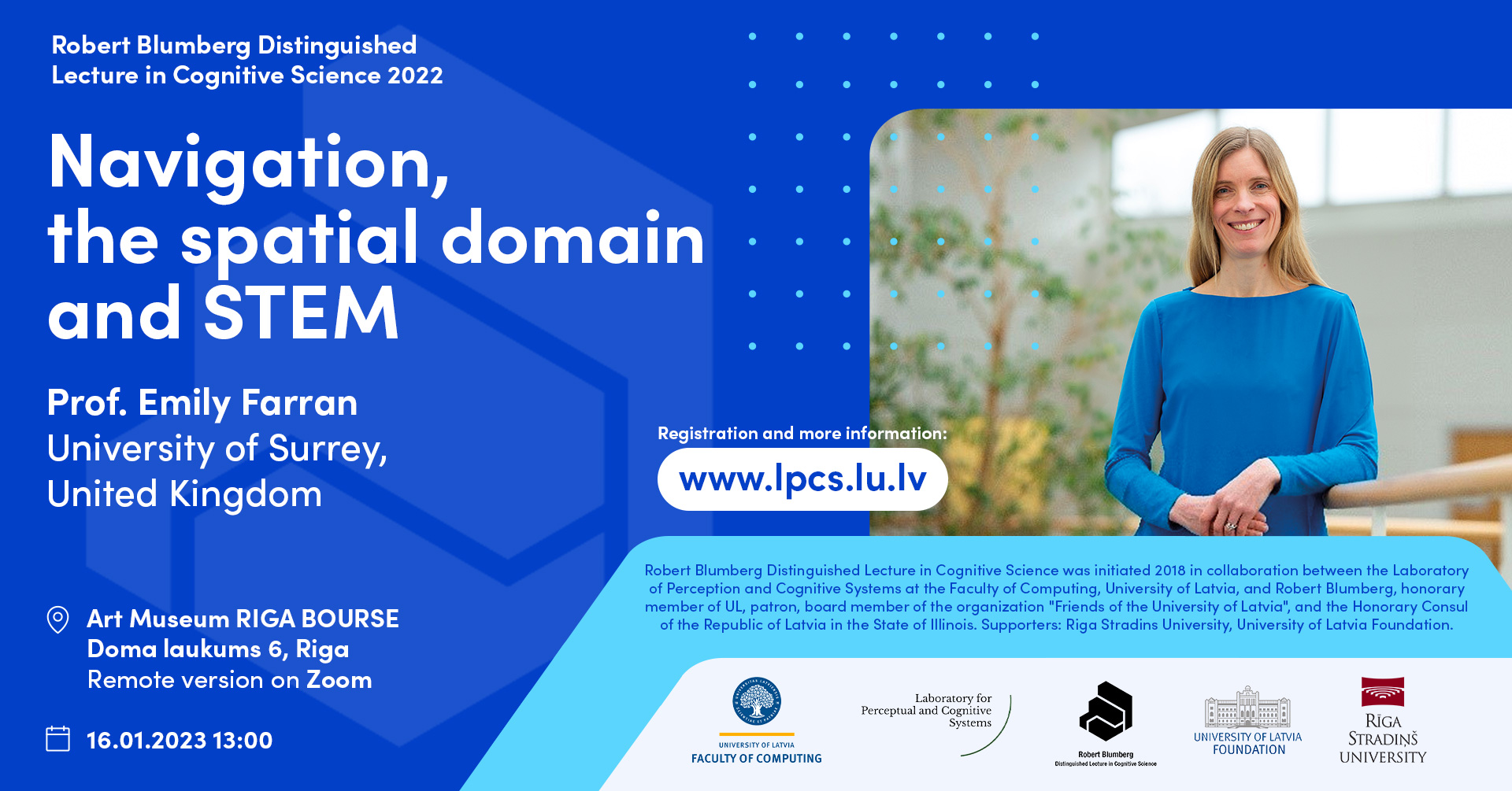The Robert Blumberg 2022 Distinction Lecture in Cognitive Science will be delivered by Prof. Emily K Farran on 16 January at 13:00 at the Riga Bourse Art Museum (Doma laukums 6) and online.

Abstract
Our understanding of the development of spatial abilities has largely centred on specific questions. For example, in typical development, there has been extensive investigation regarding the existence of a geometric module, whilst in research on neurodevelopmental conditions, the functions of the ventral and dorsal visual streams, and their potential dissociations, have received significant attention. I am interested in how a task is completed. This analytical question can be approached with reference to a number of methodological techniques. For example: by taking into account the developmental influence of early impairments on later function; by determining associations across different cognitive domains; and by considering interactions across genes, behaviour, environment and the brain. I will present research in relation to the development of spatial abilities, in which we have taken these methodological considerations into account.
Spatial abilities involve perceiving the location and dimension of objects and their relationships to one another. We use these skills to pack a suitcase, when stacking a dishwasher, when navigating, and even when getting dressed (e.g. turning clothes around, aligning buttons and buttonholes). In the first section of my talk, I will discuss findings from a series of cross-syndrome comparisons of the navigation abilities of individuals with Down Syndrome and individuals with Williams Syndrome, using desktop virtual reality. Both groups demonstrated impaired navigation abilities, yet comparison between the groups revealed syndrome-specific differences in the strategies employed, and the mechanisms which drive spatial performance for each group. This has implications for differential impacts on daily-life and independence for each group. In the second section of my talk, I will discuss the association between spatial abilities and mathematics in primary school children. This is centred on evidence that spatial skills are malleable and that spatial training is effective, durable, transferable. I will introduce associational and training studies from my lab, and others, which consistently support the argument that spatial training and/or a spatialised curriculum provides one avenue for increasing children’s achievement in mathematics (and other STEM subjects).
About the Lecturer
Prof. Emily Farran, University of Surrey, has been working on neurodevelopmental disorders, spatial cognition in typical and atypical populations. Her current research focuses on typically and atypically developing children, individuals with Autism, Down syndrome, Williams syndrome, Attention hyperactivity disorder, and Developmental coordination disorder. Prof. Farran is interested in the areas of navigation, motor performance, mental imagery, spatial language, perceptual integration, visuo-spatial memory, and orientation coding. Her most recent research focuses on the relationship between spatial thinking and Science Technology Engineering and Maths (STEM) in primary school age children.
Prof. Farran is the Director of the Cognition, Genes and Developmental Variability lab at the University of Surrey, United Kingdom. She is also Director of Research at the School of Psychology, and Academic Lead Research Culture and Integrity at the University of Surrey.
In 2009, Prof. Farran was awarded the Neil O’Connor Award for research into developmental disorders by the British Psychological Society. Her research was funded by the Economic and Social Research Council, the British Academy, the Leverhulme Trust, the Nuffield Foundation, the Wellcome Trust, the Education Endowment Fund, the Waterloo Foundation, Autour des Williams, the Williams Syndrome Foundation, and Fondation Jerome Lejeune. Prof. Farran is a honorary member of the University College London.
 lu[pnkts]lv
lu[pnkts]lvThe Robert Blumberg Distinguished Lecture in Cognitive Science was initiated 2018 in collaboration with the Laboratory of Perception and Cognitive Systems at the Faculty of Computing, the University of Latvia (UL), and Robert Blumberg, honorary member of UL, patron, board member of the organisation Friends of the University of Latvia, and the honorary Consul of the Republic of Latvia in the State of Illinois. The Robert Blumberg Distinguished Lecture in Cognitive Science is the only event in the Baltic region that honours the highest level significant cross-disciplinary contributions in cognitive science. Previous lectures and affiliated events have brought together the most important researchers from the fields of perception, psychology, music, mathematics, and neuroscience to mention just a few. Support for this lecture is administered by the University of Latvia Foundation.
Location
Tā kā Rīgas Stradiņa universitāte ir publiska iestāde, pasākuma laikā jūs varat tikt fotografēts un/ vai filmēts. Fotogrāfijas un video var tikt publicēts universitātes mājaslapā, sociālajos medijos u. tml. Vairāk par savām tiesībām un iespēju iebilst pret šādu datu apstrādi varat uzzināt RSU Privātuma politikā. Ja iebilstat pret personas datu apstrādi, lūdzam par to informēt, rakstot uz rsu rsu[pnkts]lv (rsu[at]rsu[dot]lv).
rsu[pnkts]lv (rsu[at]rsu[dot]lv).
As Rīga Stradiņš University (RSU) is a public institution you could be photographed and/or filmed during the event. Your personal data might be used to further the interests of RSU, e.g. for marketing or communication activities (incl. social media coverage). Read more about your rights see the RSU Privacy Policy. Should you have any objections to your personal data being processed please inform us via e-mail at rsu rsu[pnkts]lv (rsu[at]rsu[dot]lv).
rsu[pnkts]lv (rsu[at]rsu[dot]lv).


